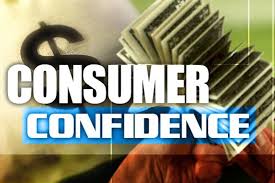The numbers: A survey of consumer sentiment slid to 63.4 in March and fell for the first time in four months, reflecting angst among Americans about high inflation and the health of the economy.
The preliminary reading in March was down from 67 in February, the University of Michigan said. Most of the survey was completed before the collapse of Silicon Valley Bank.
Consumer sentiment helps gauge how Americans feel about their own finances as well as the broader economy.
The index had fallen to a record low of 50 last summer before partly rebounding. Sentiment is still well below a recent peak of 88.3 in 2021, however, and a pre-pandemic high of 101.
Inflation expectations tapered off a bit but remained fairly high. Consumers expect prices to increase 3.8% in the next year, down from 4.1% in the prior month. That’s the lowest reading since April 2021.
Key details: A gauge that measures what consumers think about the current state of the economy dropped to 66.4 in March from 70.7in the prior month.
Sentiment fell the most among lower-income and younger Americans who tend to suffer disproportionately from high inflation. Some wealthier people with large stock holding were also less confidence in light of a recent decline in equities.
Another measure that asked about expectations for the next six months declined to 61.5 from a prior 64.7.
Americans think inflation will persist for some time. In the longer run, consumers believe inflation will increase about 2.8% a year, down slightly from 2.9% in the prior month.
That’s still well above the Federal Reserve’s 2% target, however.
Fed officials pay close attention to inflation expectations because they could be a harbinger of future price trends.
The rate of inflation over the past 12 months is 6%, based on the consumer-price index. It’s fallen from a 40-year peak of 9.1% last summer.
Big picture: Consumer sentiment is still far below levels associated with a healthy economy and it’s hard to see a big improvement anytime soon.
The Fed is raising interest rates to tame high inflation, a strategy that typically slows the economy.
Higher rates have also destabilized parts of the U.S. financial system as witnessed by the sudden collapse of Silicon Valley Bank. That’s adding new stress on the economy.














